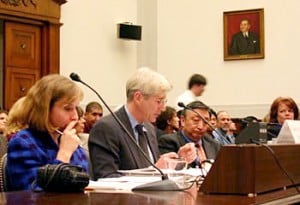
Undersecretary of State and Special Coordinator of Tibetan Issues Paula Dobriansky, ICT Chairman Richard Gere, and Special Envoy Lodi Gyari testify at the House International Relations Committee in March 2002.
Lodi Gyari, Special Envoy of His Holiness the Dalai Lama, and Richard Gere, the Chairman of the International Campaign for Tibet, also testified at the hearing.
Undersecretary Dobriansky described U.S. policy goals for Tibet as “to promote substantive dialogue” and “to help sustain Tibet’s unique religious, linguistic and cultural heritage.”
Dobriansky presented a timeline of the Bush Administration’s interventions with the Chinese on behalf of Tibet, beginning with discussions between Secretary Powell and Foreign Minister Tang last summer and continuing during the bilateral human rights dialogue in October 2001, when the U.S. “reiterated that the terrorist attacks of September 11 serve as a powerful reminder that the futures[s] of responsible nations of the world are intertwined and that we must work together to ensure peace and stability for all.”
In Shanghai in October and in Beijing in February, President Bush included Tibet in his agenda with Chinese President Jiang and urged negotiations between China’s leaders and the Dalai Lama or his representatives, “noting that the Dalai Lama’s call for genuine autonomy was sincere.”
Dobriansky made it clear to China that “The lack of resolution on this issue will be a stumbling block to fuller political and economic engagement with the United States and others.
“Indeed, the lessons of the recent past, properly construed, make the case for why Beijing should engage the Dalai Lama on the future of Tibet,” she added.
Lodi Gyari, whom the Dalai Lama has given the responsibility of assisting him to reach out to the Chinese leadership, said that in spite of sincere efforts and hard work, “we have seen no substantive movement,” but “we have not given up hope.”
Gyari continued, “Until we get a positive response for the Chinese side and our talks begin, His Holiness the Dalai Lama and those who work for him have an obligation to the Tibetan people to make every effort possible to continue to talk about the plight of the Tibetan people, both publicly and privately, and to urge the Chinese government to respond to our sincere effort.”
Gere, having just returned from Bodh Gaya, India, where he met recent arrivals from Tibet, focused his remarks on religious persecution in Tibet and Tibetan refugees, especially the increasingly precarious circumstances for Tibetan refugees transiting Nepal. He highlighted relevant findings contained in ICT’s soon-to-be-released refugee report, including:
- Increased incidents of refoulements, the forced returning of Tibetans fleeing Chinese persecution, at the Nepal-Tibet border;
- A clampdown on Tibetans without official papers in long-established refugee settlements in Nepal;
- A new restrictive attitude in Nepal with regard to Tibetan cultural and religious events;
- The rise of hostile youth groups with ties to the Chinese Embassy in Kathmandu.
Gere urged the Congress “to make inquiries of the U.S. Ambassador in Kathmandu, Nepalese authorities, and the UNHCR” concerning ways to return to what had been a crucial, workable solution for Tibetans seeking freedom in exile. He also urged the U.S. Government “to encourage the UNHCR in Kathmandu to be vigilant and proactive in carrying out their protective duties concerning Tibetan refugees.”
Reacting to the hearing, the chairman of the Tibet Autonomous Region government, Lekchok, reportedly said that “the Dalai Lama and his followers have no authority to represent the Tibetan people,” and condemned Dobriansky for her “indiscreet remarks and blind judgment.”

